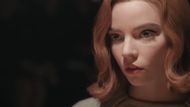TV show characters that end up challenging the norms of patriarchy are some of the most interesting characters in a TV show. Not only do they show an independent resolve that sets them apart, but they also highlight the fact that in a world where patriarchy still rules, it is time that TV show characters break down such limiting notions and offer powerful media representations for people to inspire. From the quiet resolve of Dana Scully to the fiery energy of Leslie Knope, here are 7 TV show characters that broke the glass ceiling.
Peggy Olson, Raymond Holt, and other TV show characters that were a voice against patriarchy
1. Captain Raymond Holt – Brooklyn Nine-Nine

Played by Andre Braugher, Raymond Holt is the quiet but formidable pillar of strength and duty in the famous TV show. He quietly and sternly challenges patriarchal norms that espouse only for homosexuality. Brooklyn Nine-Nine is a progressive TV show because it allows its characters to be real and authentic. Holt is a Black and openly gay police captain who is in a traditionally hyper-masculine profession. Therefore, he challenges the patriarchy with his choice of profession immediately. Further, the fact that he is openly gay and does not hide that fact about himself is also a challenge to the traditionalist societal values. He simply dismantles all kinds of patriarchy in the TV show by being on top. Raymond Holt can be both strict when the situation demands him to be and someone who looks after his staff like his family and adores dogs and classical music. He therefore questions the black-and-white, straight-cut notions about patriarchy by being a figure who is fluid. Holt doesn’t need to shout as he demands respect due to his integrity and silent yet looming presence. Throughout the TV show, he refuses to be reduced to stereotypes and even shares the struggles he faced in the 1960s as one of the few gay police officers. Further, he even opens an organization to support other Black LGBTQ police officers like him, and he therefore dismantles patriarchy in his own way.
2. Peggy Olson – Mad Men

Another TV show that is hyper-masculine in nature and focuses on the male-dominated field of advertising in the 1960s is Mad Men. Yet, there is an important character on the TV show that dismantles the patriarchy from within. Starting as Don Draper’s secretary and unsure of the male-dominated world that she has stepped into, Peggy Olson, played by Elisabeth Moss, starts off as a scared and unsure character in the TV show. And yet, she begins to find her voice and realizes that her true calling is in copywriting, a role that women rarely ventured into. She is one of the bravest characters in a series where bravado is usually reserved for men. Even though Don Draper and other men might celebrate their loud victories after getting to sign a deal, it is characters like Peggy Olson who actually shine through their small achievements in the background. She refuses to be confined to the patriarchal notions of what a woman’s role in the office should be like, and she does not want to be a secretary or a submissive employee. Instead, Olson asserts her talent and wants recognition. She begins by finding her voice and outwitting men who try to belittle her. Olson also learns to advocate for herself in a system that is made to silence her. Her growth becomes final when she negotiates her own salary and walks into McCann-Erickson with confidence.
3. Leslie Knope – Parks and Recreation

Parks and Recreation might be a modern comedy TV show, but it still needs strong characters that focus on crushing the outdated notions of patriarchy. Especially since the show is all about the traditionalist avenues of bureaucracy that are governed by men. Played by Amy Poehler, Leslie Knope is one of the most trailblazing feminist heroines in the TV show. One of the most important and defining aspects of her character is that she offers unwavering support to other women. She is optimistic, ambitious, and uses her feminist powers in a world of patriarchal workplaces. Even when she is surrounded by the small-town patriarchal politics, Knope dares to be passionate and unapologetically herself. There are many instances in the show where she is undermined by old-school male colleagues and underestimated about her talents. Still, she remains fixed in her pursuit of justice and equality. In a world where men don’t do the needful to provide public services, it is only Knope who believes in being a loyal public servant. Further, she supports her friends and empowers girls. Knope redefines leadership through her empathy and unique attitudes and highlights the fact that one does not have to be rough and cold to be in a public service position. Knope is the much-needed feminist icon in a TV show that we all need in today’s times.
4. Villanelle – Killing Eve

While other women characters try to challenge the patriarchy by being on the right side of the law and still being traditionally “feminine,” Villanelle from Killing Eve subverts all those notions. The popular TV show highlights how women can also subvert the power structure and challenge all the traditional notions of how a woman should behave under patriarchy. Villanelle is one of the most stylish and unpredictable characters in the TV show, and she embodies many of the “masculine” attributes that society does not allow women to revel in. Villanelle kills people without remorse; she does not feel guilt and shame like women are forced to feel, and she does not conform to the black and white definitions of how a woman should behave. She is one of the most stylish characters in the TV show, and her liking towards fashion is for herself and not for the male gaze. Most importantly, she is unpredictable and chaotic, which is a huge challenge to the patriarchal notions about women being somber and serene. She flips the traditional power structures and is bis*xual and showcases obsession, desire, and love outside patriarchal framing. Villanelle does not care about patriarchy or any such notion and is ruthlessly selfish in a world where women are forced to be selfless due to the restrictions put in place by patriarchy.
5. Beth Harmon – The Queen’s Gambit

A TV show that openly revolves around a woman dismantling and challenging the world of men and chess, The Queen’s Gambit, is a famous show that is elevated by the hypnotic character of Beth Harmon, played by Anya Taylor-Joy. The show is set in the 1960s, when men not just ruled the world of chess but the entire world and any public avenue. While the world of patriarchy surrounds her, Harmon is focused on sitting at the chess table and not just winning the game but also dominating it. Throughout the TV show, Beth Harmon refuses to be constrained by the limitations put upon her by patriarchy and is a genius from her childhood. During an important scene, Harmon meets her classmate from school, who is amazed by Harmon’s ability to carve a place for herself in a “man’s” world, and her classmate, on the other hand, is dejected about being a wife and a mother as her entire identity. Even when her talent is questioned and underestimated, Harmon keeps rising. She doesn’t cater to the male egos around her, and even when she has dark secrets of her own, she battles through it all and proves that she is a strong woman. Instead of a man being the tortured male genius, it is Beth Harmon who is the tortured female genius. As she battles addiction and isolation, she still breaks records and highlights how lonely it gets for women at the top. She believes in herself the most and is therefore a subversive and strong feminist icon.
6. Dana Scully – The X Files

One of the earliest feminist icons in a TV show. Dana Scully, played by Gillian Anderson, is one of the few female characters who challenged patriarchy by being a powerful doctor and FBI agent, both positions that are dominated by men. Dana Scully is able to challenge patriarchy by her act of choosing a male-dominated profession and excelling in it. She is one of the few female characters in a TV show who does not conform to either/or stereotypes about women and is a well-rounded and independent character. In the TV show, it is Scully who is the skeptic and the rational one, and Mulder is the one who believes in the paranormal and often gets emotional. Therefore, she subverts the trope that women are the ones who are emotional and easily believe in the supernatural. Throughout the TV show, Scully carries herself with grace and tries to answer every supernatural occurrence through the lens of science, which is a character trait usually reserved for men. Even when she faces underestimation, she does not crack under pressure and quietly but sternly goes on to dismantle patriarchal notions and work independently. Smart, beautiful, and intelligent, Scully was one of the first few female characters on a TV show that allowed women to be more than regressive stereotypes. It is no wonder, then, that Scully led to the “Scully Effect,” which encouraged women to get into STEM.
7. Daenerys Targaryen – Game of Thrones

Even though her character ended on a controversial note, Daenerys Targaryen was one of the defining and central characters on Game of Thrones because of her ability to subvert the male-dominated world of the TV show. The famous show was set in a medieval world where women were either sold into marriage and bore children, spent their lives as concubines, or were assaulted by men repeatedly. However, Targaryen rises from the ashes and is able to present a powerful voice against the patriarchal world of the TV show. Even Targaryen starts off as a pawn in the hands of her brother and is forced to marry a man just because of her brother’s political ambitions. However, she soon turns into a leader who frees entire cities from slavery and helps the weak and the poor. She refuses to let the men around her dictate to her and listens to her own voice. The fact that she is the mother of dragons is not just literal but also symbolic. As she rides free and high and is able to capture and conquer lands, she burns down all those systems that devalue women and keep them away from their basic rights. Targaryen constantly challenges traditional notions about womanhood, and her declaration as the Breaker of Chains is an important moment that proves that she does not want to be underestimated. She forged a path for women, even if her story got darker.
